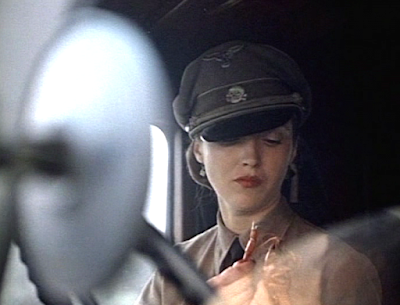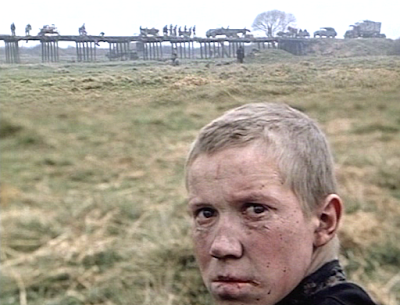Under most normal circumstances, I watch a movie, then I review it. Done, and done. In the case of this film, however, I watched it, and then decided right then and there that's there's no way I'm reviewing this. It's not that the film, directed by Elem Klimov, is lacking when it comes to boasting things that I'm interested in. I mean, it's got lots of shots of swampy forests (Polesia, baby), it has a super-cute Belarussian girl with strong Slavic thighs and it's filled with tons of authentic-looking Nazi scum acting all egregious and junk. Hell, it even has stocking tops and death slumping. I know, stocking tops and death slumping! Talk about having it all. On the other hand, it's been well over twenty-four hours since I watched Come and See (Иди и смотри or Ідзі і глядзі), and I still can't seem to shake it. Now, that's usually the sign that a movie has made an impression on the viewer. But that's just it, I don't want movies to make an impression on me; at least not the ones I normally review. For the most part, the movies I watch are typically forgotten five, maybe ten seconds after they're over. Sure, I might remember a few things here and there (especially if they're stocking top-related). But generally speaking, the whole thing becomes a bit of a blur. Hence the reason I like to watch the movies I review a second time in order to jog my memory of them. Well, as I already sort of implied, I'll never forget Come and See, as it will probably stay with me for a very long time.
It's not like the film is particularly violent or gory. There's just something oddly compelling about Flora's hellish journey through the untamed wilds of Nazi-occupied Belarus circa 1943. Oh, don't get me wrong, the film is definitely violent. But the violence is more psychological than anything else. Take, for instance, the scene where Flora (Aleksey Kravchenko), a wide-eyed teenage partisan in training, and the angelic, shapely as all get out Glasha (Olga Mironova) return to the former's village. Finding it abandoned, Flora, curious as to where his family might be, begins to run away from the village. However, as Glasha is running after Flora, she looks back and sees a pile of bullet-ridden naked corpses pilled against the side of a nearby house.
Even though we only get a brief glimpse of the violence that befell Flora's family, that's all that was needed to convey to the audience that something truly horrific had just happened.
The decision to keep the Nazi threat lingering in the shadows for as long as possible also added to the overall sense of dread. And, on top of that, it gave their eventual unveiling all the more power. In fact, and I think most viewers will agree, the sequence where the lowlifes belonging to the Oskar Dirlewanger-esque division of Waffen-SS men, a rag-tag collection of collaborators, common criminals, foreign volunteers and true believers, revel themselves in the harsh light of day to Flora and the audience for the very first time is the film's most jarring.
Loosely based on the Khatyn massacre (not to be confused with the Katyn massacre, an earlier event that saw thousands of Poles executed by the NKVD), where the Dirlewanger Brigade rounded up the all the civilians and herded them into barns, which they then set alight and blasted with rifle and machine gun fire, the build up to the actual massacre has a frenzied unrelenting quality about it that will paralyze some viewers.
Of course, some might say that being paralyzed by a movie is a bad thing. Personally, I find the idea of watching war movies, principally movies about World War II (a.k.a. The Great Patriotic War), as entertainment to be vulgar. So, I have no problem with the film's bleak tone. I'd even go as far as to say, the bleaker the better. And you can't get anymore bleak than Come and See.
Most so-called "Westerners" seem unaware that some of the most important battles of World War II were fought on the Eastern Front. And I'm glad movies like these exist in order to illuminate those who buy into the myth perpetuated by the racist Hollywood propaganda machine that John Wayne and those of his ilk defeated Hitler all by themselves.
Now, I wouldn't hold it against you if you were dismiss this film as Soviet propaganda sight unseen. After all, it was made in the Soviet Union (mind you, at the height of mid-1980s Gorbachevian glasnost). But the film rarely ever reeks of Soviet-style agitprop. Which, I'll admit, is something I expected it to do; I'm wary of any movie whose script needs government approval before going into production. But it doesn't... reek, that is. It's simply cinema at its most masterful.
It should be noted that one of the main reasons the film is so memorable has a lot to do with Aleksey Kravchenko's intense performance as Flora. Managing to project the anguish of his character with a simple look, the multiple shots of Aleksey's face reacting to the chaos swirling around him are some of the film's most indelible. In truth, it's Aleksey's trauma-laden face that will stay with me the longest. That, and the sight of that sexy Nazi chick (complete with swastika earrings - note to self: get ears pierced) death slumping against her recently crashed BMW R75, the stress of collision causing the tops of her jet-black Nazi stockings to become visible. I'll always remember that. Damn. I can't believe I just reviewed Come and See. I'm so freakin' versatile... it's not even funny (Witty, adorable and versatile... I'm, like, amazing). Oh, and for more on "death slumping," see my review of The Mad Foxes, a.k.a. the death slumpiest movie of all-time.









